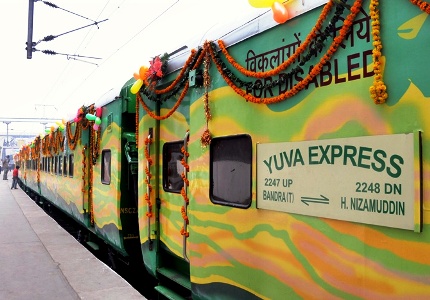 | « Back to article | Print this article |
Committee of MPs from both Houses raps neglect of sound functioning parameters, staff and system productivity, cost control
 After two years of healthy operations, a severe financial crisis has again gripped Indian Railways, says a parliamentary panel headed by former Railway Minister Dinesh Trivedi.
After two years of healthy operations, a severe financial crisis has again gripped Indian Railways, says a parliamentary panel headed by former Railway Minister Dinesh Trivedi.
Rebutting the government’s talk of a visible turnaround in operations, it has highlighted declining system productivity, rise in unit cost of operation and an unrealistic Operating Ratio target, based on ‘textbook solutions’.
The 31-member panel, of both chambers, lauded IR for staging a turnaround to achieve 76 OR in 2007-08.
“Unfortunately, it is again under a severe financial crisis.
“Its OR -- money spent to earn Rs 100 -- has deteriorated to 93.6, the ratio of net revenue to capital is 5.6 per cent and the surplus was only Rs 3,740 crore (Rs 37.4 billion) in 2013-14,” the committee said in its 85-page report, presented in Parliament.
Actual earnings are likely to be short of the revised estimates for 2014-15 by Rs 2,500 crore (Rs 25 billion) and, thus, the projected improvement in OR might not materialise to any significant extent.
The actual OR could be 92.5-93.5, it said.
The OR had come down from 93.6 in 2013-14 to 91.8 in 2014-15 and is projected to improve to 88 this financial year.
However, says the Trivedi panel, the OR for FY15 would have been close to 100 if IR made adequate provision for depreciation, based on the actual requirement of replacement of over-aged assets.
This ‘under-provisioning’ is piling up delayed works of the order of Rs 41,871 crore (Rs 418.71 billion).
Appropriation for the development fund, used for taking up works for uninterrupted flow of traffic, had declined from Rs 7,800 crore (Rs 78 billion) in 2013-14 to Rs 1,305 crore (Rs 13.05 billion) in 2014-15.
“Under-provisioning for depreciation and the inability of Railways to generate enough cash flows for servicing and increased borrowings for financing of rolling stock have resulted in a sharp decline in track renewals, procurement of wagons, coaches and electric locomotives.
“Simply stated, the Railways are not generating enough cash flows for running as a going concern on a continuing basis,” the report said.
These factors have adversely impacted system productivity, which had started falling after 2012-13.
The input cost per net tonne kilometre -- the broad measure of systems productivity for freight operations -- rose from 31.19 paise in 2011-12 to 32.61p in 2013-14, a deterioration of 4.5 per cent.
Unit cost per passenger kilometre has gone up from 22.82 to 23.21p, a decline of 1.7 per cent in productivity.
Further, NTKM per wagon day has come down from 9,261 in 2011-12 to 8,471 in 2013-14, wagon turnaround time has deteriorated from 5.08 to 5.13 days and NTKM per employee had declined from 0.55 to 0.53 in this period.
“The Railways’ input cost per NTKM has gone up by around 15 per cent each in 2012-13 and 2013-14, one of the sharpest increases in unit cost of freight operation in recent years.
“Similarly, passenger unit cost has gone up 13.4 per cent in 2013-14 over 2012-13 but the Railways unfortunately appear totally unaware of this disturbing trend,” the report has said.
According to the panel, growth in passenger earnings of up to 18 per cent between 2012 and 2015 were achieved on the back of a sharp increase in fares and not due to improvement in throughput.
“In their replies, IR admitted originating passengers grew by 2.4 per cent in 2012-13, dipped by 0.3 per cent in 2013-14 and 2.12 per cent in 2014-15 (till February).
“The passenger throughput is likely to fall rather more sharply by over 3.5 per cent from 1,159 billion PKM to 1,117 billion PKM as per traffic plan of 2015-16,” it said.
IR might get the benefit of the latest passenger fare rise, of June 2014, for the first three months of the current financial year but thereafter, the entire growth of nearly 19 per cent would have to be achieved through increase in the number of originating passengers and PKMs, which appears extremely unlikely, if not impossible, the committee said.
It also questioned Railways Minister Suresh Prabhu’s decision of not announcing new trains and projects.
“No new trains is not a good idea. People living in remote, under-developed, tribal and hilly areas have been waiting for decades for a rail link,” Trivedi said.
On the ministry’s move to seek lending from multilateral institutions, the panel cautioned against falling into a debt trap and said IR must study the bankability of projects ‘in minute detail’ before implementing any financing model.